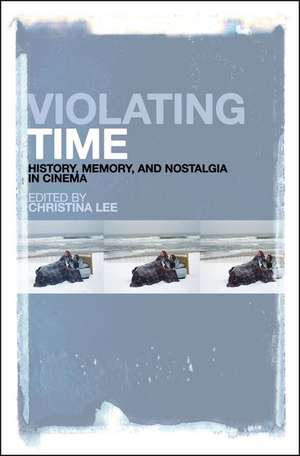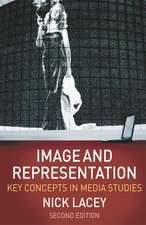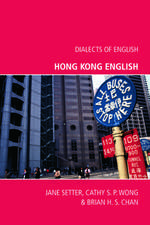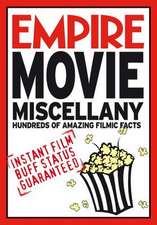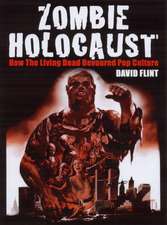Violating Time: History, Memory, and Nostalgia in Cinema
Editat de Dr Christina Leeen Limba Engleză Paperback – 6 iun 2012
Preț: 272.51 lei
Preț vechi: 349.10 lei
-22% Nou
Puncte Express: 409
Preț estimativ în valută:
52.15€ • 55.76$ • 43.48£
52.15€ • 55.76$ • 43.48£
Carte tipărită la comandă
Livrare economică 17 aprilie-01 mai
Preluare comenzi: 021 569.72.76
Specificații
ISBN-13: 9781441151315
ISBN-10: 1441151311
Pagini: 256
Ilustrații: 15
Dimensiuni: 155 x 234 x 18 mm
Greutate: 0.45 kg
Editura: Bloomsbury Publishing
Colecția Continuum
Locul publicării:New York, United States
ISBN-10: 1441151311
Pagini: 256
Ilustrații: 15
Dimensiuni: 155 x 234 x 18 mm
Greutate: 0.45 kg
Editura: Bloomsbury Publishing
Colecția Continuum
Locul publicării:New York, United States
Caracteristici
This book is a solid edited collection with a strong theme and a good line-up of international scholars.
Notă biografică
Christina Lee is Lecturer in Communication and Cultural Studies at Curtin University, Australia.
Cuprins
Acknowledgments
Notes on Contributors
Introduction (Christina Lee)
Notes on Contributors
Introduction (Christina Lee)
1. "The Cracks Between": Cinematic and Proto-Cinematic Counter-Memories of the American Civil War (Zoe Trodd)
2. Our Impossible Failings: The Rhetoric of Historical Representation, Ideology, and Subjectivity in Ken Burns' Jazz (J.A. Rice)
3. "Zero Percent Chance of Rain": The Watergate History and All The President's Men (Pamela L. Kerpius)
4. Staying for Time: The Holocaust and Atrocity Footage in American Public Memory (Steven Alan Carr)
5. Nostalgic Travels Through Space and Time: Good Bye, Lenin! (Roger F. Cook)
6. The Temporal/Spatial Logic of Japanese Nationalism: The Narrative Structure of Film and Memory (Michael Sugimoto)
7. Remembering a Film and "Ruining" a Film History: On Tian Zhuangzhuang's "Failure" to Remake Spring in a Small Town (Yiman Wang)
8. "We'll Always Have Hong Kong": Uncanny Spaces and Disappearing Memories in the Films of Wong Kar Wai (Christina Lee)
9. "No Future for You": The Sex Pistols and the Politics of Cinematic Reimaginings (Adam Trainer)
9. "No Future for You": The Sex Pistols and the Politics of Cinematic Reimaginings (Adam Trainer)
10. The American Family (Film) in Retro: Nostalgia as Mode in Wes Anderson's The Royal Tenenbaums (Daniel Cross Turner)
11. Manifesting a Mutant Past in Eternal Sunshine of the Spotless Mind (Michael Pigott)
12. When People Run In Circles: Structures of Time and Memory in Donnie Darko (James Walters)
13. What a Difference A Day Made: Database Narratives and Avatar Subjectivities in the Alternate-Reality Film (Chuck Tryon)
13. What a Difference A Day Made: Database Narratives and Avatar Subjectivities in the Alternate-Reality Film (Chuck Tryon)
Recenzii
Mention -Book News, February 2009
The contest between time and motion is at the centre of many modernist accounts of cinema. Lee's welcome collection re-considers some of the contradictions of this dichotomy through a number of fascinating analyses of films that re-consider the belief in time as the organising force of contemporary aesthetics. Contributors note that cinema is the pre-eminent technology of nostalgia and this book reminds us that the memories embedded in film are as much about the subversion of the present as the recapitulation of the past. --Stephi Hemelryk Donald, Professor of Comparative Film and Cultural Studies, University of New South Wales
Our 21st century world is torn between two attitudes toward time: to freeze it, or to liberate it. Cinema is the cultural medium that has most readily converted our complex experience of time into solid spaces, into sequences of emotion, and into stories - and beloved movies themselves become like places that we revisit, nostalgically ... And yet cinema also presents, with equal force, another possibility: the potential to multiply time, to slow time down and speed it up, to interrogate time and subvert the social order that it serves. In this lively and illuminating collection, Christina Lee has expertly gathered penetrating pieces on everything from Holocaust footage to Donnie Darko, from Asian screen classics to multimedia puzzles. Every contribution opens up history, memory or nostalgia in complex ways, inviting us to create a richer future - on screen and off. --Associate Professor Adrian Martin, Monash University, co-editor of LOLA magazine and Movie Mutations: The Changing Face of World Cinephilia
The contest between time and motion is at the centre of many modernist accounts of cinema. Lee's welcome collection re-considers some of the contradictions of this dichotomy through a number of fascinating analyses of films that re-consider the belief in time as the organising force of contemporary aesthetics. Contributors note that cinema is the pre-eminent technology of nostalgia and this book reminds us that the memories embedded in film are as much about the subversion of the present as the recapitulation of the past. --Stephi Hemelryk Donald, Professor of Comparative Film and Cultural Studies, University of New South Wales
Our 21st century world is torn between two attitudes toward time: to freeze it, or to liberate it. Cinema is the cultural medium that has most readily converted our complex experience of time into solid spaces, into sequences of emotion, and into stories - and beloved movies themselves become like places that we revisit, nostalgically ... And yet cinema also presents, with equal force, another possibility: the potential to multiply time, to slow time down and speed it up, to interrogate time and subvert the social order that it serves. In this lively and illuminating collection, Christina Lee has expertly gathered penetrating pieces on everything from Holocaust footage to Donnie Darko, from Asian screen classics to multimedia puzzles. Every contribution opens up history, memory or nostalgia in complex ways, inviting us to create a richer future - on screen and off. --Associate Professor Adrian Martin, Monash University, co-editor of LOLA magazine and Movie Mutations: The Changing Face of World Cinephilia
